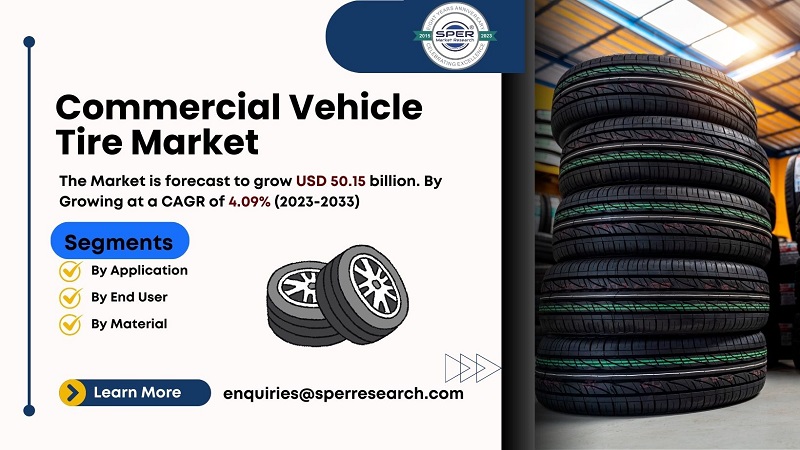Tires for commercial vehicles are specifically made to accommodate the weight and operating needs of heavy-duty vehicles, such buses, lorries, and trailers. Commercial tires are designed for long-distance transportation and demanding driving conditions because they are stronger, more fuel-efficient, and can support heavier loads than ordinary passenger car tires. Strong tread patterns provide them improved stability, traction, and safety on a range of surfaces. Commercial vehicle tires are also made to endure more wear and tear, guaranteeing durability and dependability. As the emphasis on sustainability in the transportation sector grows, eco-friendly tire solutions that enhance fuel economy and reduce emissions have been developed due to innovations in tire technology, including developments in materials and designs.
According to SPER Market Research, ‘Commercial Vehicle Tire Market Size- By Application, By End User, By Material, By Sales Channel, By Terrain- Regional Outlook, Competitive Strategies and Segment Forecast to 2033’ states that the Global Commercial Vehicle Tire Market is estimated to reach USD 50.15 billion by 2033 with a CAGR of 4.09%.
Drivers:
Numerous important reasons are driving the worldwide market for tires for commercial vehicles. The rise in e-commerce and international trade has led to a greater need for logistics and transportation services, which in turn has increased the need for commercial vehicles and their tires. The increasing number of commercial cars on the road is partly a result of urbanization and infrastructure development initiatives. Furthermore, developments in tire technology such as the creation of environmentally friendly and fuel-efficient tires improve performance and sustainability, drawing fleet operators. The market is also driven by regulations that support environmental compliance and safety. Another major factor driving market expansion is the increasing trend of fleet modernization, which involves swapping out outdated cars with newer ones that come with cutting-edge tire technology.
Restraints:
Numerous obstacles might prevent the worldwide market for tires for commercial vehicles from expanding. Price fluctuations for raw materials, especially for synthetic and rubber materials, can affect a manufacturer’s profit margins and manufacturing costs. The market is also characterized by fierce rivalry, which puts pressure on prices and lowers profitability. Manufacturers have technological problems as a result of the expanding trend of vehicle electrification, which calls for tires to be created for distinct performance characteristics. The production process is further complicated by the need to comply with safety and emissions regulations. The COVID-19 pandemic demonstrated how supply chain interruptions may also affect tire availability, which in turn affects market stability and growth.
Request for Free Sample Report @ https://www.sperresearch.com/report-store/commercial-vehicle-tire-market.aspx?sample=1
The COVID-19 pandemic caused supply chain disruptions and temporary manufacturing closures, which had a significant effect on the worldwide commercial vehicle tire industry. There was a scarcity of tires for commercial vehicles as a result of these interruptions, which caused delays in tire manufacture and supply. Tire sales were further impacted by the decrease in demand for commercial vehicles caused by the suspension of international trade and transit during lockdowns. However, the sector was revitalized when economies started to recover and e-commerce growth accelerated, increasing the demand for logistics and transportation services. After the epidemic, manufacturers also started emphasizing sustainability and innovation, which resulted in advances in tire technology.
Asia-Pacific dominates the global commercial vehicle tire market due to the high demand for commercial vehicles driven by rapid industrialization, significant investments in infrastructure development, and a large manufacturing base. Major players in the market are ATG Tires Private Limited, Balkrishna Industries Limited, Bridgestone Corporation, Continental AG, Goodyear Tyre and Rubber Company, Others.
Global Commercial Vehicles Tires Market Segmentation:
By Application: Based on the Application, Global Commercial Vehicles Tires Market is segmented as; Agriculture, Construction, Mining, Transport
By End User: Based on the End User, Global Commercial Vehicles Tires Market is segmented as; OEM, Aftermarket
By Material: Based on the Material, Global Commercial Vehicles Tires Market is segmented as; Natural Rubber, Nylon Cord Fabric and Wire, Poly Butadiene Rubber, Styrene Butadiene Rubber
By Sales Channel: Based on the Sales Channel, Global Commercial Vehicles Tires Market is segmented as; Offline, Online
By Terrain: Based on the Terrain, Global Commercial Vehicles Tires Market is segmented as; Off-Road, On-Road
By Region: This research also includes data for North America, Asia-Pacific, Latin America, Middle East & Africa and Europe.
For More Information, refer to below link: –
Commercial Vehicle Tire Market Forecast
Related Reports:
Follow Us –
LinkedIn | Instagram | Facebook | Twitter
Contact Us:
Sara Lopes, Business Consultant – USA
+1-347-460-2899








